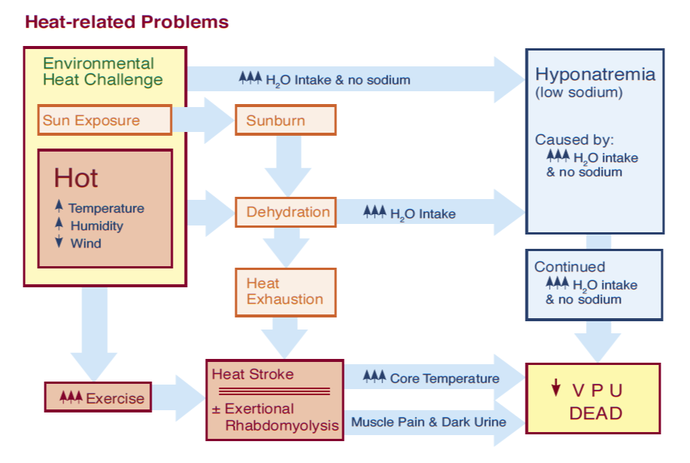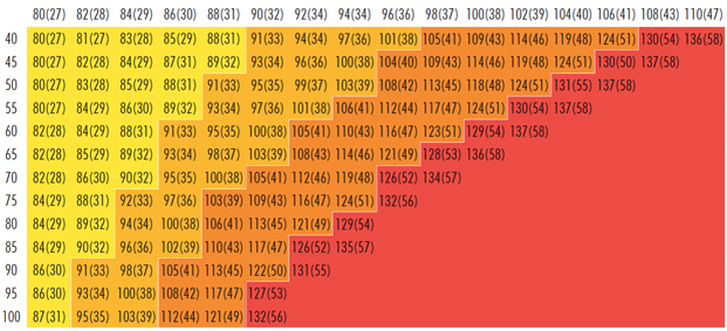|
Introduction Heat is part of summer; some people love it...and others, not so much. Regardless of which camp you reside in, excessive heat, typically combined with exercise, can cause a number of potentially fatal, and certainly uncomfortable, heat and heat-related problems (e.g., dehydration, heat exhaustion, heat stroke, exertional rhabodomyolysis, and exercise-associated–exertional–hyponatremia; refer to the graphic below to see the relationship between the major heat related problems). Prevention and proper hydration is key to avoiding all heat-related illnesses, and the cornerstone of prevention is to allow your body enough time to acclimatize to a new heat challenge. With that said, the drugs listed below can predispose outdoor adventurers to a variety of heat illnesses and heat-related problems. Check to see if your friends, clients, or students are taking any of them before venturing into the outdoors this summer when it's hot outside. (A printed drug guide, app, or website will help you understand the side effects, contraindications, and administration guidelines for most drugs.) If you find that they are taking a drug that predisposes them to a heat illness:
The National Weather Service (NWS) heat index values in the above chart are for shaded, light-wind conditions. Exposure to full sunlight can increase heat index values by up to 15° F; and, strong winds, particularly with very hot, dry air, can be extremely hazardous Anticholinergics Anticholinergic drugs block the transmission of the neurotransmitter acetylcholine in the central and peripheral nervous system responsible for the autonomic control of the smooth muscles primarily in the gastrointestinal (GI) tract, the genitourinary tract, and the lungs. They are used to treat:
Antihistamines Antihistamines block histamine receptor sites in mast cells and basophils, smooth muscle, the lining of lymph and blood vessels, and histamine-releasing neurons in the brain. There are two subcategories of antihistamines: H1 and H2; both are used to treat allergies. H2 antihistamines, because they bind to histamine receptors in the gut, are also used to treat peptic ulcers and acid reflux and H1 antihistamines, because they cross the blood-brain barrier and bind to histamine receptors in the hypothalamus, may be used to treat insomnia in adults and motion sickness. Similar to anticholinergic drugs, antihistamines inhibit sweating and predispose people to both heat exhaustion and heat stroke. Opioids Opioids—including their semi-synthetic and synthetic derivatives—are used to manage both acute and, to a lesser extent, chronic pain; strong opioids are highly addictive. Codeine, a weak opioid, is commonly used in over-the-counter (OTC) pain medications and cough suppressants. Loperamide, an opioid that cannot cross the blood-brain barrier acts on the large intestine to suppress diarrhea. All opioids decrease blood flow to the skin and predispose people to heat stroke. Pseudoephedrine Pseudoephedrine is a stimulant that acts on the smooth muscle lining the blood vessels and bronchi causing them to constrict; it is used to treat sinus and nasal congestion and promote drainage of the sinuses and the Eustachian tubes. Because it's a vasoconstrictor, pseudoephedrine decreases blood flow to the skin and predisposes people to heat exhaustion and heat stroke. Diuretics Prescription diuretics are first-line drugs used to treat high blood pressure. Along with caffeine, prescription diuretics promote dehydration via excessive urination and, through that route, predispose people to heat exhaustion, heat stroke, and—because they deplete the body of sodium—hyponatremia. Selective Serotonin Reuptake Inhibitors (SSRIs) SSRIs are a class of drugs primarily used to treat depression and anxiety disorders but may also be used to treat post traumatic stress disorders (PTSD). The exact therapeutic mechanism is unknown and the side effects of SSRIs may outweigh their benefit. All SSRIs can cause dehydration, which, in turn, can lead to more serious heat illnesses. Ibuprofen & Naproxen Both ibuprofen & naproxen belong to a family of drugs called non-steroidal anti-inflammatory drugs (NSAID) that are commonly carried in first aid kits to treat pain or reduce a fever. While neither drug predisposes people to a heat illness, CAUTION is advised as they can cause kidney damage in the presence of dehydration. Antipsychotics Antipsychotics block receptor sites in the brain's dopamine pathways and are used to treat schizophrenia and bipolar disorders, and combined with antidepressants to treat depression in the short term. Unfortunately, they can inhibit the body’s ability to regulate temperature and predispose people to heat stroke. Beta Blockers Beta receptors are found in the smooth muscle cells of arteries, bronchi, kidneys, and the heart. When stimulated by epinephrine and other stress hormones, they cause a sympathetic stress response that, among other things, increases heart rate and blood pressure. Beta blockers weaken the stress response and are primarily used to manage abnormal heart rhythms and prevent a second heart attack. (They may also be used to treat high blood pressure but are not as effective as diuretics.) They reduce blood flow to the skin and and predispose people to heat stroke. Calcium Channel Blockers Calcium channel blockers disrupt the movement of calcium through cell membranes and are used to treat high blood pressure. They help increase the elasticity of the wall of large blood vessels allowing them to stretch and expand. In this way they also reduce chest pain caused by angina pectoris. They are more effective than beta blockers but have more side effects. Similar to beta blockers, they also reduce blood flow to the skin and predispose people to heat stroke. Ephedrine, Amphetamines, & Cocaine Ephedrine, amphetamines, and cocaine are central nervous system stimulants. Ephedrine is used as a stimulant, appetite suppressant (currently banned in the United States), concentration aid, and decongestant; it works by increasing the activity of norepinephrine. Amphetamines are used to treat attention deficit hyperactivity disorder (ADHD) and narcolepsy. Cocaine is made from the leaves of the coca shrub with no current medicinal use; it is primarily used as a recreational drug...as are many amphetamines. Ephedrine, amphetamines, and cocaine increase internal body temperature, constrict blood vessels, and predispose people to heat exhaustion and heat stroke. Tricyclic Antidepressants Tricyclic Antidepressants (TCAs), as the name implies, are primarily used in the treatment of mood disorders; they are also used to treat chronic neuropathic pain and as migraine prophylaxis (but will not treat a migraine attack). TCAs also decrease sweating and inhibit the body’s ability to regulate temperature and predispose people to heat exhaustion and heat stroke. ACE Inhibitors ACE inhibitors are primarily used to treat heart and kidney problems. They block the production of enzymes that cause vasoconstriction and permit blood vessels to relax (dilate) reducing both blood and kidney pressure. ACE inhibitors may cause increased sweating in some patients, which may quickly lead to dehydration in a heat challenge, and by that route predispose people to heat exhaustion and heat stroke. Lithium Lithium is a mood stabilizer used to treat bipolar disorders and is primarily cleared via urine. While lithium does not predispose people to any heat illness, if a client taking lithium loses a lot of fluid quickly through sweating—which, depending on the individual can easily occur in a moderate or severe heat challenge—their lithium level may quickly rise to toxic levels.
Looking for a reliable field reference? Consider consider purchasing one of our print or digital handbooks; our digital handbook apps are available in English, Spanish, and Japanese. Updates are free for life. A digital SOAP note app is also available.
0 Comments
Your comment will be posted after it is approved.
Leave a Reply. |
Categories
All
Our public YouTube channel has educational and reference videos for many of the skills taught during our courses. Check it out!
|



 RSS Feed
RSS Feed
